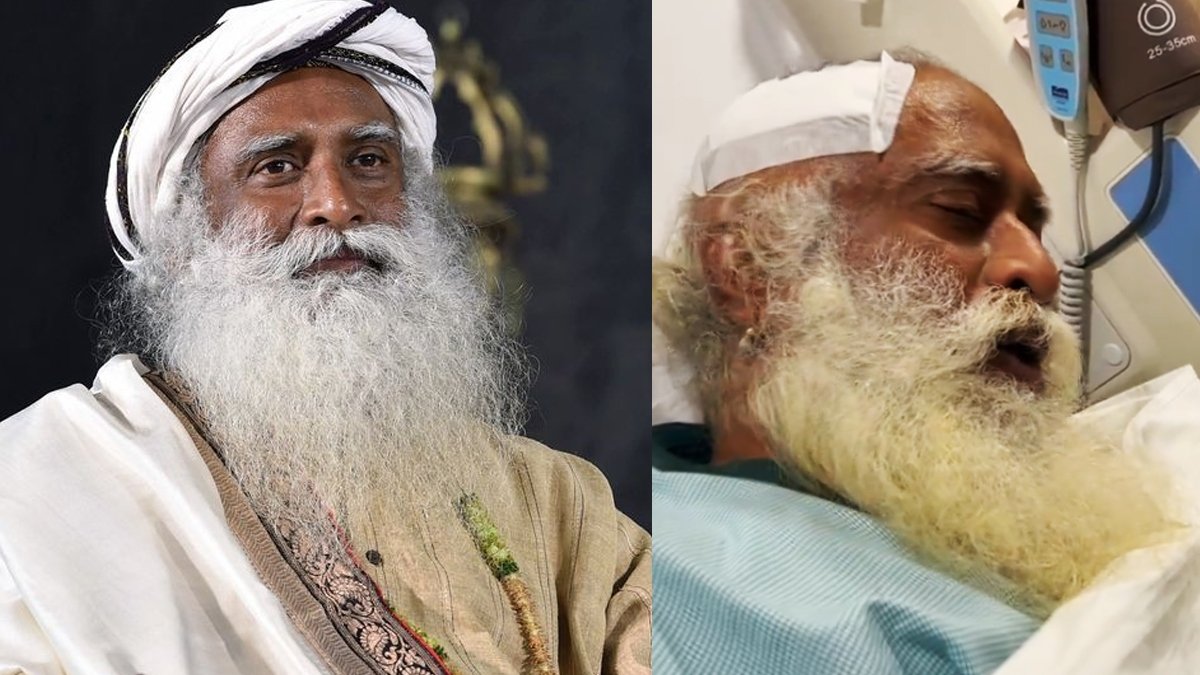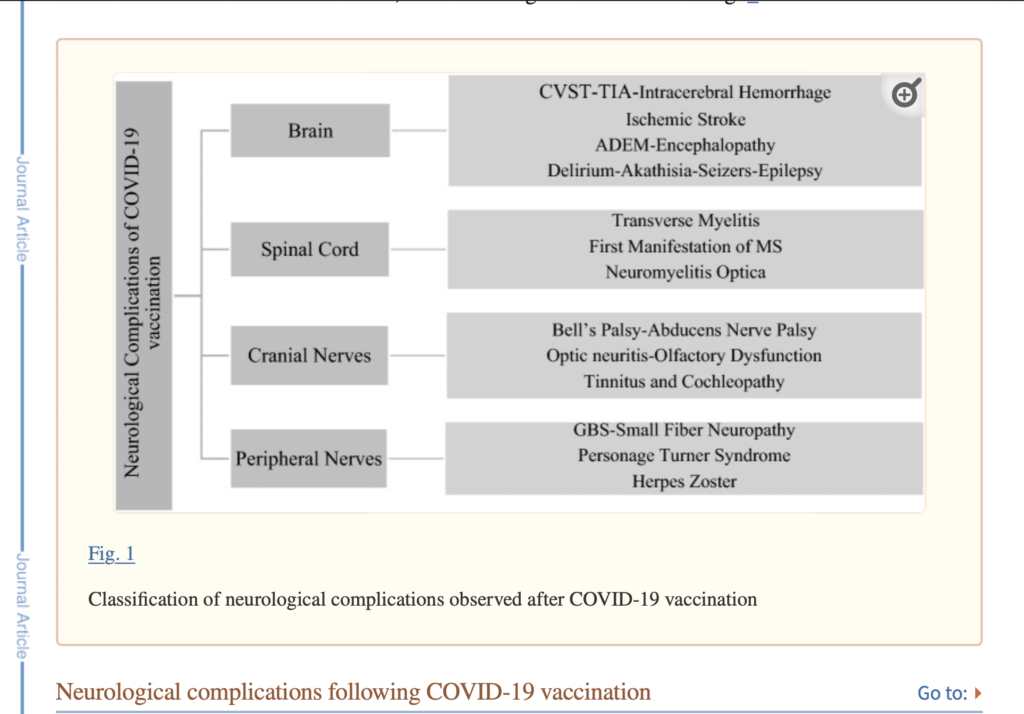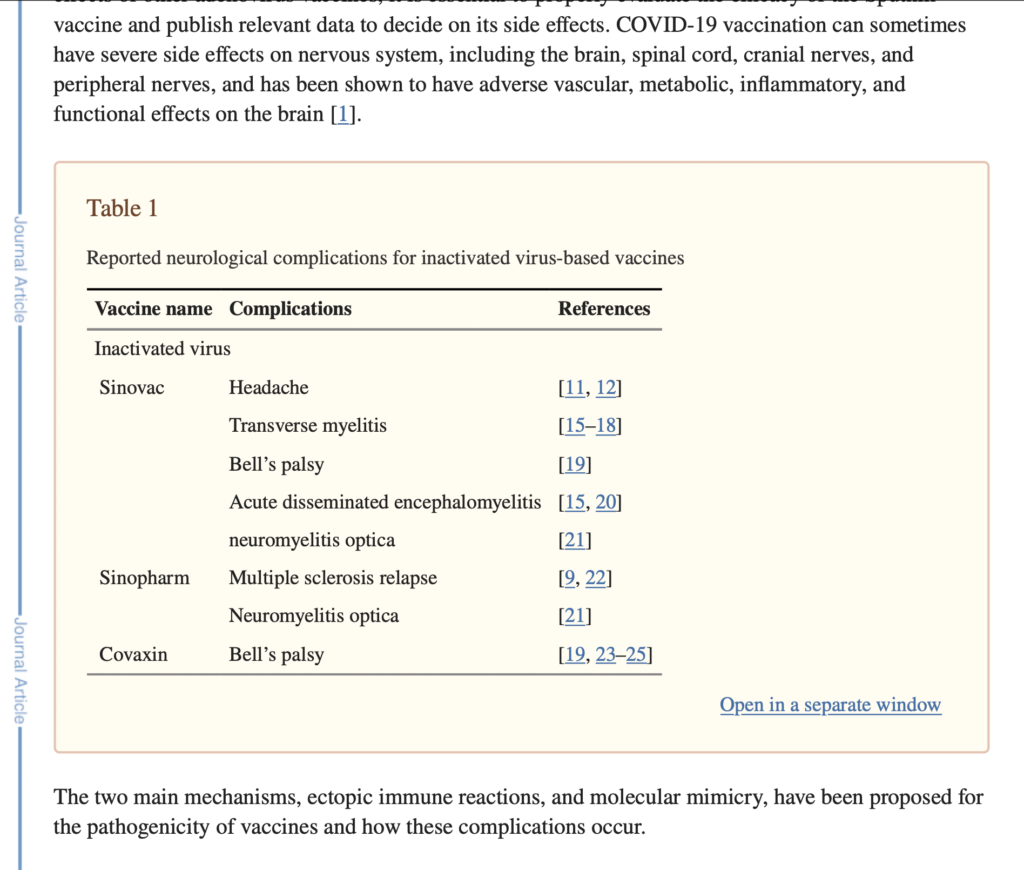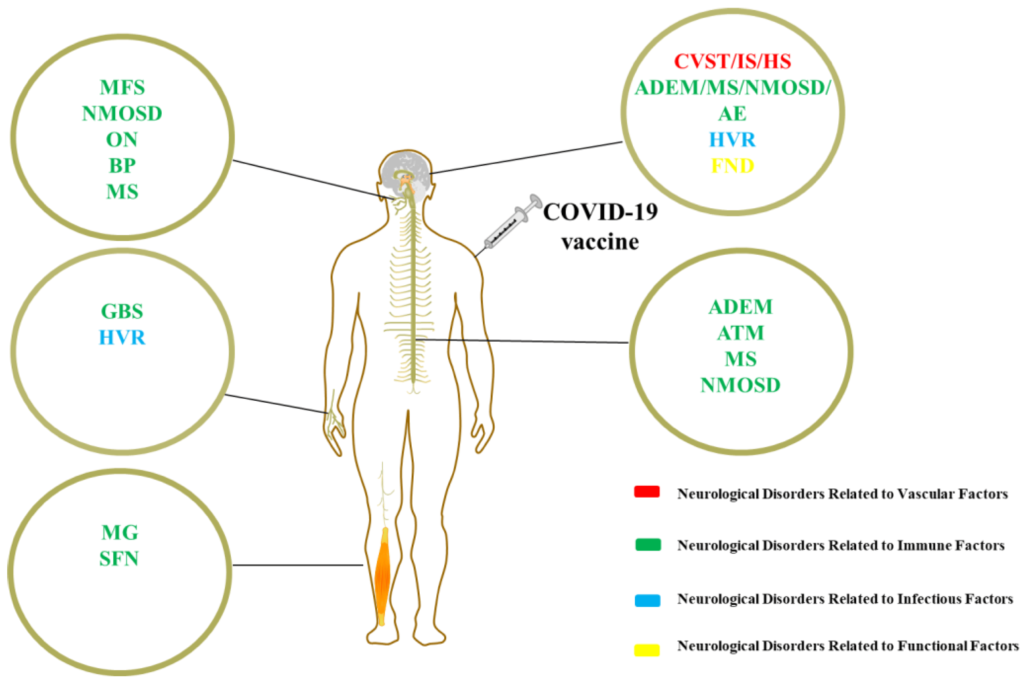In recent times, a hot topic of discussion is the potential side effects of vaccines. Many citizens are expressing concerns and questioning if Sadhguru Jaggi Vasudev’s hospitalization and emergency brain surgery could be linked to vaccine side effects. As the health crisis of Sadhguru unfolds, discussions have emerged about the potential risks associated with vaccination and whether these risks outweigh the benefits.
The debate surrounding vaccine safety has been ongoing for years, with some people expressing concerns about potential side effects and long-term health risks.
Across the globe, numerous health professionals, scientists, and individuals have argued and shown evidence that vaccines have not been proven to be safe and effective in preventing the spread of infectious diseases.

ET Nov 21, 2020: I want to be the last person to receive Covid vaccination, says Sadguru Jaggi Vasudev
“If you ask me about vaccines, I would be the last person to get vaccinated for any pandemic including Covid-19. I would address the reason why I am saying this later. But, top priority should be accorded to high-risk population groups like policemen, doctors, and marginalized workers among others. They should get the vaccine first to arrest the pandemic in India,” he said at a virtual interaction at the Bengaluru Tech Summit 2020.
He referred to his remarks that he would be the last person to get vaccinated in a conversation with Chief Scientist at the World Health Organization Dr. Soumya Swaminathan in October 2019, where he had cautioned about the side-effects or negative impacts of vaccinations.
Opindia 20 March, 2024: Journalist Anand Narasimhan shared an update on Sadhguru’s health, stating that Sadhguru was suffering from severe headaches for the past several days.
As per reports, he was admitted to Apollo Delhi after a massive swelling and bleeding in his brain was detected on March 17.

NIH Report:
COVID-19 vaccination can sometimes have severe side effects on nervous system, including the brain, spinal cord, cranial nerves, and peripheral nerves, and has been shown to have adverse vascular, metabolic, inflammatory, and functional effects on the brain


Vaccine Brain Injury:

Additional Informtion:
What is a vaccine brain injury?
A vaccine-caused brain injury is a potential consequence of receiving a vaccination. In rare cases, like encephalitis, there may be an inflammation of the brain which can lead to some nasty symptoms like headaches, a stiff neck, seizures, and even mental confusion. Although the risks of acquiring a brain injury from a vaccine are very low, they can be debilitating and life-changing.
Can A Vaccine Cause A Brain Injury?
Individuals concerned about vaccines causing brain injuries raise questions about how vaccines can enter the brain and trigger neurological conditions. It’s crucial to recognize that our brains are safeguarded by a protective barrier known as the blood-brain barrier (BBB), which protects against foreign substances entering the brain.
The BBB is a protective membrane that separates the brain from the rest of the body. It consists of tightly linked cells that form barriers called “tight junctions,” preventing substances from passing through and entering the brain. The BBB acts as a gate, allowing essential nutrients like glucose to cross into the brain while keeping out pathogens and harmful substances.
The BBB restricts the passage of immune cells, helping to prevent brain inflammation. However, in cases where pathogens damage the BBB, these organisms can enter the brain, leading to Meningitis (inflammation of the meninges) and Encephalitis (inflammation of the brain). These serious conditions may result in permanent brain damage, often requiring hospitalization or death.
It is important to note that vaccine components would need to overcome the protective barrier of the BBB to affect the brain. The BBB is designed to prevent the entry of foreign substances, reducing the likelihood of vaccines reaching the brain and causing neurological conditions.
What type of vaccine may Cause A Brain Injury?
There are increasing volumes of studies and research to demonstrate that some vaccines can cause brain injuries. Living in a data-centric society permits an easier exchange of knowledge, so our understanding of the potential risks from vaccinations is better than ever. For a complete reference, The Vaccine Injury Table provided by the Vaccine Injury Compensation Program (VICP) has a systematic breakdown of the potential symptoms and time frame.
The following table shows vaccine brain injuries and the responsible vaccine:
| Injury | Vaccines potentially causing this |
| Encephalitis/Encephalopathy | Influenza MMR COVID DTaP Varicella (chickenpox) |
| Guillain-Barré Syndrome (GBS) | Influenza COVID |
| Chronic Inflammatory Demyelinating Polyneuropathy (CIDP) | Influenza DTaP Hepatitis BMMR |
| Acute Disseminated Encephalomyelitis (ADEM) | Influenza Hepatitis BMMR |
As mentioned above, the MMR vaccine may have been categorically disproven regarding its potential to cause autism, but more than sufficient evidence exists to link it to Encephalitis.
Contrary to this, a study on the potential risk of brain injuries after receiving the pertussis vaccine dismissed the notion, according to ‘Gerald S. Golden, Pertussis vaccine and injury to the brain.’ Although the study notes the increased risk of convulsion, no consistent neuropathological findings suggested brain injuries were a direct causal link from immunization.
There have been many rumblings and divisions surrounding COVID-19 vaccinations, including the potential for vaccine brain injuries. One such case of Encephalitis after a booster shot of Moderna COVID-19 was presented. In another study, research reveals that although Encephalitis is an uncommon complication of COVID-19, when present, it results in significant morbidity and mortality, according to ‘Siow, I., Lee, K. S., Y. Zhang, J. J., Saffari, S. E., & Ng, A. (2021). Encephalitis as a neurological complication of COVID-19: A systematic review and meta-analysis of incidence, outcomes, and predictors. European Journal of Neurology, 28(10), 3491-3502.’ Severely ill COVID-19 patients are at higher risk of suffering from Encephalitis as a complication of the infection.
We encourage everyone to keep updated about the latest research and findings.
What Are The Symptoms of A Vaccine-Caused Brain Injury?
Different injuries and syndromes will have different effects on each individual. However, there are some consistent symptoms to look out for to help identify these unfortunate cases.
Encephalitis usually starts with flu-like symptoms, such as a high temperature and headache. More serious symptoms come on over hours, days, or weeks, including:
- Confusion or disorientation
- Seizures or fits
- Changes in personality and behavior
- Difficulty speaking
- Weakness or loss of movement in some parts of the body
- Loss of consciousness
Guillain-Barré Syndrome (GBS) often starts in your feet and hands before spreading to your arms and legs. (CIDP is considered a chronic version of GBS and, thus, has similar symptoms).
At first, you may have:
- Numbness
- Pins and needles
- Muscle weakness
- Pain
- Problems with balance and coordination
Chronic Inflammatory Demyelinating Polyneuropathy (CIDP) diagnoses can be challenging as they lead to confusion with Guillain-Barré Syndrome (GBS) due to similar symptoms. However, if symptoms persist for more than eight weeks, healthcare providers may start considering CIDP as a potential diagnosis.
Acute Disseminated Encephalomyelitis (ADEM) symptoms manifest rapidly. Initially, your child may experience fatigue or irritability. It is also common for a viral illness accompanied by fever to precede the onset of symptoms by a few days to a few weeks. Additional symptoms may include:
- Nausea and vomiting
- Headache
- Confusion
- Weakness
- Ataxia (unsteady walk)
- Sensory changes, including numbness or tingling
- Optic neuritis (trouble with vision)
- Seizures
The location of the inflammation (swelling) within the brain and spinal cord determines what symptoms occur.
What Are The Differences Between Adult and Child Symptoms of Vaccine Brain Injuries?
Infants and children with brain injuries generally have a poorer prognosis than adults with similar injuries. Since their brains are still developing, there is a chance that a baby’s or child’s brain can adapt and recover well from an injury. However, brain growth and development disruptions can result in irreversible damage in most cases.
In contrast, assessing the extent of damage in adults who experience brain injuries is usually simpler. Adults already have an established personality, with a known baseline of their physical and mental abilities.
Effects of Brain Injury on Babies/Children:
Physical Impact: Motor skills may be limited or absent, potentially delaying important developmental milestones such as crawling, walking, reaching, grasping, and speaking.
Emotional Impact: Children may experience depression, frustration, anger, or denial as they cope with the changes caused by the injury.
Social Functioning: The child’s ability to interact with others may change, making engaging in socially appropriate behaviors more challenging. Learning/Memory – Short-term memory can be significantly impaired, affecting the child’s ability to retain and recall information.
Functional Skills: Children may struggle with tasks involving focus, planning, multitasking, and other mental processes necessary for completing tasks efficiently.
Educational Achievement: These impairments can substantially hinder a child’s academic pursuits.
Effects of Brain Injury on Adults:
Impaired Cognitive Skills: Adults may experience difficulties performing previously mastered skills and tasks, such as reading, writing, and problem-solving. They may exhibit slower speech and thought processes.
Mood/Behavior: Adjusting to changes in mood and behavior can be particularly challenging, as it can feel like the injured person has become a different individual. Mood swings and behavioral issues can lead to anger, frustration, and depression for the person with the brain injury and their loved ones.
Senses/Perception: Vision problems, including blurred sight and reduced depth perception, are common. There can also be a disconnect between perception and comprehension. Hearing, touch, taste, and smell may become more or less sensitive and acute.
Regardless of age, we recommend seeking medical advice immediately if you notice any of these symptoms in a loved one.
What Are The Symptoms of Vaccine Brain Injuries in The Elderly?
As individuals age, the risk of acquiring a brain injury increases, regardless of whether they already have it. In Canada, older adults (60 years or older) account for 29% of all head injury hospitalizations, according to Brain Injury Canada. The highest rates are seen in those aged 85 and older. Both males and females have similar rates.
Recovery after acquired brain injury is significantly influenced by age. Older populations tend to have greater long-term effects and poorer prognosis, including higher mortality rates, worse functional outcomes, and a need for more rehabilitation.
Effects of brain injury on the elderly are:
- Depression: Brain injuries can increase the risk of depression in the elderly. The physical and cognitive changes can contribute to feelings of sadness and loss.
- Irritability and Emotional Instability: This can increase irritability, mood swings, and emotional instability. The elderly may experience difficulty controlling their emotions and may exhibit sudden outbursts of anger or frustration.
- Anxiety: Anxiety disorders, such as generalized anxiety or post-traumatic stress disorder (PTSD), can develop or worsen following a brain injury. Elderly individuals may experience heightened worry, restlessness, and fearfulness due to the traumatic event and its consequences.
- Cognitive Changes: Brain injuries can result in cognitive impairments, including problems with memory, attention, and hard skills.
- Social Withdrawal and Isolation: The functional limitations and cognitive challenges caused by a brain injury may lead to social withdrawal and isolation in the elderly. They may feel self-conscious about their difficulties or struggle to engage in social activities, resulting in decreased social interactions and potential feelings of loneliness.
- Disinhibition and Impulsivity: In some cases, brain injuries can lead to disinhibition and impulsivity, causing the elderly to act without considering the consequences. They may become more impulsive, make inappropriate comments, or exhibit poor judgment.
Regardless of age, we recommend seeking medical advice immediately if you notice any of these symptoms in a loved one.
What Are the Long-Term Effects of Vaccine Brain Injuries?
Acquired Brain Injuries (ABIs), which include non-traumatic brain injuries like vaccines, can significantly impact cognitive function, language skills, memory, attention, and information-processing abilities. Studies show that these impairments can result in partial or total disability, hindering a functional and psychosocial recovery in the long term, according to ‘Giustini A, Pistarini C, Pisoni C. Traumatic and nontraumatic brain injury. Handb Clin Neurol. 2013;110:401-9. doi: 10.1016/B978-0-444-52901-5.00034-4. PMID: 23312659.’ This situation harms clinical outcomes, social well-being, and economic stability. Furthermore, the social costs associated with disability or loss of life due to ABIs are substantial, and healthcare systems bear considerable financial burdens, ranking among the highest expenses in Europe.
An update on neurological adverse events from COVID-19 vaccines
Source: ET, Youtube, Indiaglitz-Image, My Vaccine Lawyer, MDPI-Image, Advantage Healthcare System,
Also Read:
